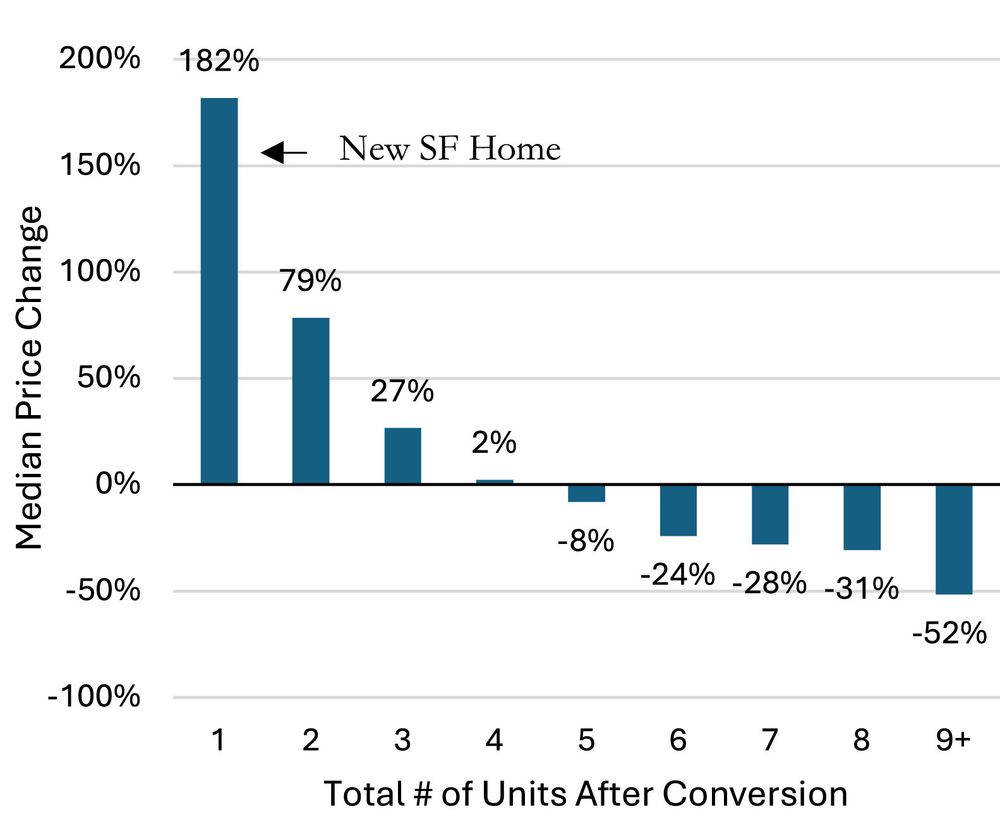When four homes replace a SFH, each new home is about the same price as the original, and at 5 units or more, the new homes tend to be more affordable. But the critical comparison is to the 1-for-1 replacement — a mansionization, in other words.
Replies
So when 4 units replace one, property tax revenue ~quadruples? That's pretty surprising
I always thought the “developers put in a four plex and charge the same amount” was a joke
It's largely because the homes they replace tend to be among the smallest and most run-down in a given neighborhood. Makes a lot more sense replacing those than something bigger or recently renovated.
The researchers find that the sites that get redeveloped tend to be larger parcels with older, smaller homes. There's no world where these homes are preserved as affordable starters — they're getting redeveloped either way. Do we want them to be mansions 3x as expensive as the original? I don't.
What would be really compelling to developers would be a line graph superimposed with its own axis showing the relative profitability of building 1, 2, many units Presumably median price is per unit but overall profitability is on the project
We passed zoning reform 2 years ago in Durham, NC after a very tough, very long public campaign. This point is something the NIMBYs just could not accept. They'd complain about all the new million dollar homes but fight every effort to allow more, less expensive homes.
These townhomes are serving a younger, less affluent, more racially diverse population than Seattle's detached single-family houses. And this data is on homeowners specifically, who make up over 70% of the households living in the townhomes.
This. In my 35 years in one house the block has changed from a wide variety of blue collar, nurse, teachers, minister, etc to much bigger homes with all professionals w high earnings. And now these neighbors don’t want apartments as they’d change the hood’s character. They already did!
We covered a lot in this conversation — more than I've summarized here. Give it a listen and let us know what you think. www.lewis.ucla.edu/2025/07/30/9...
This is happening everywhere. First time home buyers , willing to buy a "fixer upper" are out bid. The result, less housing for the lower income.
We are older and we sold our family home to travel. Now we are done and we want one of those little houses but they've all been badly rehabbed and are selling for what our 4 bed 2 bath ranch sold for only two years ago. We have the equity from our house but there's nothing to buy.
And the "convert one bungalow into 4 townhouses each costing more than the bungalow" projects around me all go up extremely fast, and the few I've walked through look poorly constructed (drawers slide open on their own because upper doors aren't level, etc). Great for developers, though!
Upwards of 20,000 people in Seattle have bought them, so maybe they know something you don't
Glad to know so many Seattleites are moving to Houston! I'd expect what the people buying them know is that (I hope) they can pay for them and they're in a location they want and they pass safety codes and inspection minimums. I don't see anyone claiming they're high quality construction, though.
*upper floors, not upper doors
I agree with your take, but locals here want to use zoning to make it impossible to redevelop old homes. Their argument is that old homes represent an existing store of affordability, and the best way to maintain that affordability is to prevent any changes to the building, using restrictive zoning.
We actually talk about this -- why anti-mansionization ordinances, for example, aren't effective.
I have subscribed! Looking forward to checking it out. I agree that anti-mansionization ordinances do not work. God knows they have tried very hard to make them work in our town.
My neighborhood in Raleigh, they tore down two small houses worth $300k and will be building 10 townhomes that will sell for $900 each. Seems to be a trend
Our home in Denver is a townhouse. One of eight units that replaced a single family house on the property. Not only were we able to afford it because it was cheaper than what was there before, it was also *new* when we bought it.
I love this and I’m confused by it. In my suburb just north of Seattle (5 minutes on I-5 and you hit the city line) new townhomes start around $600k. Are they more affordable in specific neighborhoods? Or is more affordable meant in comparison to the median price for a SFH?
They looked at the price of the home before redevelopment and the price of each home after, giving them the ratio/%, and the numbers here are the median result by the number of replacement units. Sometimes the original home would be $600k, other times $1MM, etc.
Got it. Thanks for the info!

